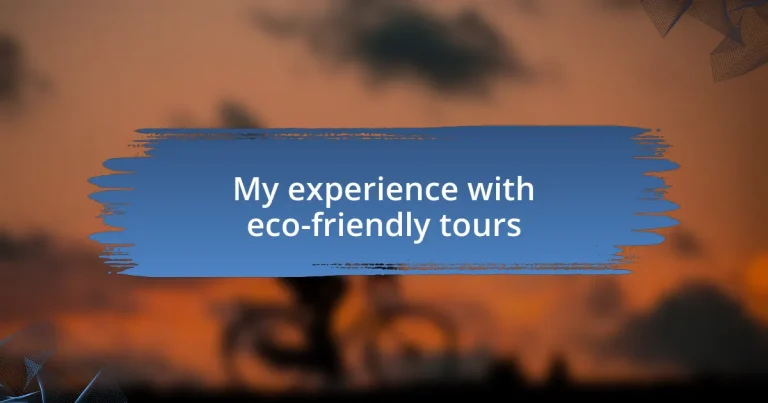Key takeaways:
- Eco-friendly tours foster a deep connection to the environment and local communities while promoting sustainable practices.
- Choosing eco-friendly options supports conservation, enriches local economies, and encourages cultural respect.
- Research and certifications are key to finding genuine eco-friendly travel experiences, along with community engagement opportunities.
- Simple sustainable practices, such as using public transportation and reducing waste, can significantly enhance travel experiences and lessen environmental impact.

Introduction to eco-friendly tours
Imagine stepping into a world where your travel choices contribute to the well-being of the planet. Eco-friendly tours not only allow you to explore breathtaking landscapes but also invite you to engage with local communities and support sustainable practices. When I first joined an eco-tour, I felt an immediate connection to the environment that made each moment meaningful.
During my journeys, I’ve witnessed firsthand how eco-friendly tours prioritize conservation initiatives, from wildlife protection to minimizing pollution. It was eye-opening to see guides who shared their passion for their natural surroundings, fostering not just awareness but genuine gratitude for the beauty around us. Isn’t it powerful to think that our travels can help preserve such wonders for future generations?
Participating in eco-friendly tours also means being part of a larger movement towards sustainability in the travel industry. Reflecting on my experiences, I often wonder how our choices today shape the world tomorrow. Choosing tours that respect nature and cultures feels less like a trend and more like a responsibility that connects us deeply to the places we visit.

Benefits of choosing eco-friendly options
Choosing eco-friendly options while traveling comes with a mix of personal fulfilment and significant environmental benefits. During one of my eco-tours, I had the opportunity to plant trees alongside local communities. The sense of community was invigorating, knowing we were contributing to a greener planet together. Each small effort adds up, leading to healthier ecosystems that not only benefit wildlife but also enrich our experiences.
The economic advantages of eco-friendly tours are also notable. I remember visiting a small village that thrived because of sustainable tourism. It was inspiring to see how local businesses flourished without compromising their cultural integrity or natural resources. Supporting these initiatives gives travelers like us a chance to make meaningful contributions, ensuring both the environment and communities are ushered into a sustainable future.
Selecting eco-friendly travel options has a lasting impact on our mindset and habits as well. I’ve found myself becoming more conscious of my footprint, making small changes at home inspired by my travels. It’s fascinating how these experiences can reshape our values, pushing us towards healthier choices that extend beyond travel, ultimately encouraging a more sustainable lifestyle.
| Benefits of Eco-Friendly Options | Traditional Travel Options |
|---|---|
| Supports local communities | Often benefits large corporations |
| Encourages conservation and sustainability | Can contribute to environmental degradation |
| Promotes cultural respect and understanding | May overlook local customs |

How to find eco-friendly tours
When searching for eco-friendly tours, I recommend starting with a little online research. Many websites specialize in sustainable travel, providing an extensive database of vetted eco-friendly options. I often find that reading reviews from like-minded travelers helps me gauge the authenticity of the tours. Recently, I stumbled upon a small eco-lodge in Costa Rica through a blog post. The glowing accounts of other travelers made it easy to decide, and the experience exceeded my expectations.
Here are some tips to help you find eco-friendly tours:
- Look for certifications, like Green Globe or EarthCheck, which indicate a commitment to sustainability.
- Check local tourism boards for recommendations on eco-friendly operators and practices.
- Follow travel blogs or forums focused on sustainable tourism to gather firsthand experiences.
- Ask about the environmental policies of tour companies, including their waste reduction and conservation efforts.
- Seek out tours that involve community engagement, like volunteering or cultural exchange activities.
These steps can lead you to genuinely responsible travel experiences that align with your values.

My eco-friendly tour experiences
During my travels, one of the most memorable eco-friendly tours I experienced was in the lush forests of Costa Rica. As I hiked through the vibrant greenery, guided by a local naturalist, I felt a deep connection to the environment. He shared stories about the delicate ecosystem and the ongoing efforts to preserve it, sparking my curiosity about sustainable practices.
I also engaged in a community-based tour in a small village, which truly opened my eyes to the impact of tourism. Participating in a local farming activity not only allowed me to learn about organic practices but also helped me understand the balance between tourism and local livelihoods. It was heartwarming to see how the villagers shared their traditions, and I left feeling enriched and inspired to support such initiatives in the future.
Reflecting on these experiences, I often wonder how many travelers are aware of the positive influence they can have by choosing eco-friendly options. Each choice we make can have a ripple effect, encouraging sustainable practices and empowering local communities. For me, these tours have not only been about exploration but also about fostering a deeper appreciation for the places I visit.

Tips for sustainable travel
When planning your next trip, consider using public transportation or biking instead of relying on cars or taxis. I remember one time in Amsterdam, where I rented a bike to explore the city. It was not only fun but also allowed me to see the area from a different perspective while minimizing my carbon footprint. Have you ever felt the freedom that comes with cycling through picturesque streets, knowing you’re making an eco-friendly choice?
Choosing eco-conscious accommodations can truly enhance your travel experience. On a recent trip to a sustainable lodge in the mountains, I was pleasantly surprised by how comfortable and welcoming it felt. The owners prioritized sustainability, using local materials and promoting energy conservation. This made me feel good about where I was staying, as I was supporting a business aligned with my values. How often do we think about where we lay our heads at night?
Make a habit of reducing waste during your travels. Packing a reusable water bottle is one of the simplest yet most impactful steps you can take. I started this practice on a trip to a tropical island and found that not only did it cut down on plastic waste, but it also saved me money. Plus, it felt good to be part of a community of travelers who prioritize our planet’s well-being. It’s such a small change, but it can lead to significant results. Have you ever considered how little changes can create a big impact?

Resources for planning eco-friendly trips
When it comes to planning eco-friendly trips, I’ve found that utilizing online platforms dedicated to sustainable travel can be a game-changer. Websites like EcoTourism.org offer a wealth of information on eco-friendly destinations and services. In one of my recent trips, I stumbled upon a local eco-tour operator through their directory, and it turned out to be one of the highlights of my journey. Have you ever discovered a hidden gem that completely transformed your travel experience?
Don’t overlook the value of travel apps that focus on sustainability. For instance, I’ve used apps such as GreenMap to find green spaces and sustainable attractions throughout cities I visit. This not only enriched my understanding of local culture but also connected me with like-minded travelers. How often do we underestimate technology’s role in enhancing our eco-conscious travels?
Additionally, guidebooks that emphasize responsible tourism practices can provide insightful tips and local advice. On a recent trip, I referred to a sustainable travel guide that highlighted conservation efforts in the region, and I was inspired to participate in a local beach clean-up. This not only made my visit more meaningful but also created a bond with the community. Have you considered how engaging with locals can deepen your travel experiences?


